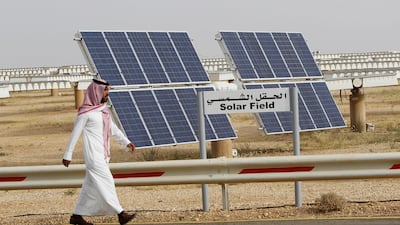The development of Saudi Arabia’s renewable energy sector could result in the creation of up to 750,000 jobs over the next decade as the kingdom pushes to generate 7 per cent of its total electricity output from renewables by 2030, according to a study.
Solar power is set to account for 77 per cent of all renewables added to the grid by 2030, with clean energy capacity poised to increase to 5.3 gigawatts over the same period, the US-Saudi Arabian Business Council said.
“In order to achieve its medium- to long-term renewable energy objectives, the kingdom must prioritise the sector within its budgetary planning and allow for continued foreign investment attraction,” the report led by the council’s chief economist, Albara’a Alwazir, said.
“The level of ongoing investment in the sector is expected to create up to 750,000 jobs over the next 10 years, assuming renewables remain a priority sector. Localising the manufacturing base will provide for most of the employment opportunities as the kingdom aims to localise the sector to [between] 40 per cent [and] 45 per cent by 2028 and beyond.”
Saudi Arabia, a founding member of Opec, is the world’s largest exporter of oil. The kingdom has moved away from burning fossil fuel to generate electricity and has made the development of renewable energy for power generation a priority in its push to free up more crude for export.
The kingdom’s energy ministry set up a Renewable Energy Project Development Office in 2018 to oversee the development of solar and wind projects.
It is pursuing an ambitious renewable power strategy and plans to add 60 gigawatts of clean energy capacity to the national grid by 2030. Of this, 40 gigawatts will come from solar photovoltaic plants, 16 gigawatts from wind turbines and 2.7 gigawatts from concentrated solar power, according to the kingdom’s Ministry of Energy.
Earlier this year, Saudi Arabia launched the third round of its renewable energy programme, which is intended to add 1.2 gigawatts of solar photovoltaic power capacity to the grid. The kingdom is also developing its first wind project, a 400MW plant in the Al Jouf region. The project, awarded to Abu Dhabi’s Masdar and EDF, reached financial close last year.
However, the US-Saudi Arabian Business Council said the kingdom’s renewable energy programme could be delayed due to coronavirus-induced project cancellations.
“The negative effects of the pandemic on the renewable energy sector have caused delays in the selection of winning bids for round two of NREP’s [National Renewable Energy Programme] auctions. The final selection for round two was expected to occur in April 2020 but was delayed,” the council said.
Covid-19 is expected to delay the completion timetable for projects tendered under the second renewables round by another year, provided the pandemic is brought under control.
Similarly, an 850MW IPP wind project that is part of the third round of NREP was expected to issue invitations to companies to qualify for bidding. The project was expected to be delivered in April.
“However, there have been no announcements regarding the entities that have been selected to the next round,” the report said.
Saudi Arabia has so far allocated 270 billion Saudi riyals (Dh264.2bn) to help the private sector navigate the coronavirus-induced challenges.


